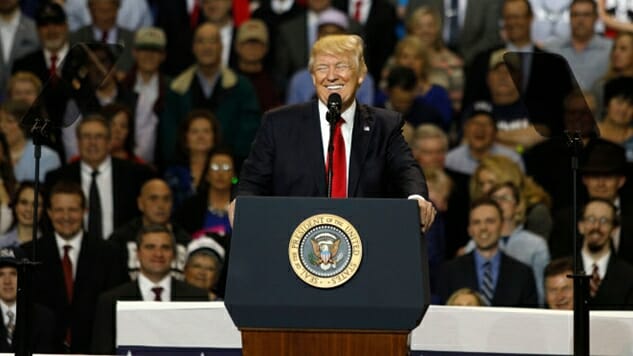Donald Trump’s Health Care Guardians
Photo by Bill Pugliano/Getty
Greg Sargent wrote a piece for the Washington Post the other day in which he posed the question of whether or not President Trump is falling into Speaker Paul Ryan’s “trap” by supporting the American Health Care Act. In was an interesting choice of words—one that, as the iconic Admiral Ackbar reminds us, usually pertains to a hapless victim falling prey to a nefarious plot.
Sargent explained that the proposed AHCA legislation potentially steps on the populist messaging that Trump ran his successful campaign on. As many will remember, Trump promised early in the Republican primary that his health care plan would include “insurance for everybody” and that the government was “going to pay for it.” It was essentially an endorsement of universal healthcare—a position that conservatives and the GOP have adamantly opposed for a very long time. Thus, the pledge raised some eyebrows.
As the campaign went on, however, Trump tamped down the rhetoric and limited his health care stance to simply describing Obamacare as a “disaster” that needed to be replaced. Beyond that, he rarely spoke of the issue. In fact, until the White House confirmed back in October that insurers (through Healthcare.gov) would be raising 2017 premiums by an average of 25% (a timely political gift that Trump couldn’t ignore), health care talk had all but disappeared from his stump speeches.
It seems a bit silly, then, to worry about an early campaign promise that fell to the wayside quite a while ago. Still, according to multiple reports (some of which Sargent cited in his column), many Trump loyalists are urging that the president withdraw his support of the ACHA (which is aimed more at individual choice than individual coverage) to preserve his populist cred.
Trump’s cheerleaders in the media also want Trump to abandon the ACHA, but not on populist grounds. They’re attacking the bill from the right. Yes, after two years of shelving their conservative principles to carry the president’s water (even as he hailed universal healthcare and praised single-payer), they’ve miraculously rediscovered the wisdom of small-government principles.
-

-

-

-

-

-

-

-

-

-

-

-

-

-

-

-

-

-

-

-

-

-

-

-

-

-

-

-

-

-

-

-

-

-

-

-

-

-

-

-








































